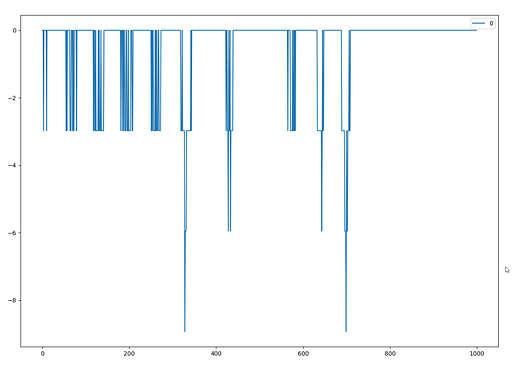Has this issue been solved? I can not find the solution above. I am experiencing the same problem: torque control mode is not working.
I have an odrive v3.6 56V and a 25V LiPo battery as power source. Fully charged, odrv0.vbus_voltage = 26V.
The green LED is on, and the 3.3V and 5V signals from the board are OK.
22nF capacitors connected to the Hall sensor inputs of the board.
I am first following the Getting Started guide.
By accident I do have a hoverboard BLDC motor with internal Hall sensors, with the exact connections like in the guide. I am using the following commands to set axis1 into velocity control, which works fine:
odrv0.erase_configuration()
odrv0.config.enable_brake_resistor = False
odrv0.config.dc_max_negative_current = -1
odrv0.config.max_regen_current = 40
odrv0.axis1.motor.config.pole_pairs = 15
odrv0.axis1.motor.config.resistance_calib_max_voltage = 4
odrv0.axis1.motor.config.requested_current_range = 50
odrv0.axis1.motor.config.current_control_bandwidth = 100
odrv0.axis1.motor.config.torque_constant = 16
odrv0.axis1.encoder.config.mode = ENCODER_MODE_HALL
odrv0.axis1.encoder.config.cpr = 90
odrv0.axis1.encoder.config.calib_scan_distance = 150
odrv0.axis1.encoder.config.bandwidth = 100
odrv0.axis1.controller.config.pos_gain = 1
odrv0.axis1.controller.config.vel_limit = 10 # 1000
odrv0.axis1.controller.config.vel_gain = 0.02 * odrv0.axis1.motor.config.torque_constant * odrv0.axis1.encoder.config.cpr
odrv0.axis1.controller.config.vel_integrator_gain = 0.1 * odrv0.axis1.motor.config.torque_constant * odrv0.axis1.encoder.config.cpr
odrv0.save_configuration() # includes a reboot
odrv0.axis1.requested_state = AXIS_STATE_FULL_CALIBRATION_SEQUENCE
odrv0.axis1.motor.config.pre_calibrated = True
odrv0.axis1.encoder.config.pre_calibrated = True
odrv0.save_configuration()
During calibration the motor makes several noises and rotations in both directions, while doing the three calibrations (motor, Hall_polarity, and Encoder_offset)
Afterwards, odrv0.axis1.motor gives:
DC_calib_phA: 0.17508473992347717 (float)
DC_calib_phB: 0.08516408503055573 (float)
DC_calib_phC: -0.260256826877594 (float)
I_bus: 0.0 (float)
config:
I_bus_hard_max: inf (float)
I_bus_hard_min: -inf (float)
I_leak_max: 0.10000000149011612 (float)
R_wL_FF_enable: False (bool)
acim_autoflux_attack_gain: 10.0 (float)
acim_autoflux_decay_gain: 1.0 (float)
acim_autoflux_enable: False (bool)
acim_autoflux_min_Id: 10.0 (float)
acim_gain_min_flux: 10.0 (float)
bEMF_FF_enable: False (bool)
calibration_current: 10.0 (float)
current_control_bandwidth: 100.0 (float)
current_lim: 10.0 (float)
current_lim_margin: 8.0 (float)
dc_calib_tau: 0.20000000298023224 (float)
inverter_temp_limit_lower: 100.0 (float)
inverter_temp_limit_upper: 120.0 (float)
motor_type: 0 (uint8)
phase_inductance: 0.0003803673607762903 (float)
phase_resistance: 0.18802085518836975 (float)
pole_pairs: 15 (int32)
pre_calibrated: True (bool)
requested_current_range: 50.0 (float)
resistance_calib_max_voltage: 4.0 (float)
torque_constant: 16.0 (float)
torque_lim: inf (float)
current_control:
I_measured_report_filter_k: 1.0 (float)
Ialpha_measured: 0.0 (float)
Ibeta_measured: 0.0 (float)
Id_measured: 0.0 (float)
Id_setpoint: 0.0 (float)
Iq_measured: 0.0 (float)
Iq_setpoint: 0.0 (float)
Vd_setpoint: 0.0 (float)
Vq_setpoint: 0.0 (float)
final_v_alpha: 0.0 (float)
final_v_beta: 0.0 (float)
i_gain: 18.802085876464844 (float)
p_gain: 0.038036737591028214 (float)
phase: 0.0 (float)
phase_vel: 0.0 (float)
power: 0.0 (float)
v_current_control_integral_d: 0.0 (float)
v_current_control_integral_q: 0.0 (float)
current_meas_phA: -0.17588825523853302 (float)
current_meas_phB: -0.08383689075708389 (float)
current_meas_phC: 0.2596939504146576 (float)
effective_current_lim: 10.0 (float)
error: 0 (uint64)
fet_thermistor:
config: ...
temperature: 22.07196044921875 (float)
is_armed: False (bool)
is_calibrated: True (bool)
last_error_time: 0.0 (float)
max_allowed_current: 60.75 (float)
max_dc_calib: 6.075000286102295 (float)
motor_thermistor:
config: ...
temperature: 0.0 (float)
n_evt_current_measurement: 4043377 (uint32)
n_evt_pwm_update: 4043381 (uint32)
phase_current_rev_gain: 0.02500000037252903 (float)
odrv0.axis1.encoder gives:
calib_scan_response: 0.0 (float)
config:
abs_spi_cs_gpio_pin: 1 (uint16)
bandwidth: 100.0 (float)
calib_range: 0.019999999552965164 (float)
calib_scan_distance: 150.0 (float)
calib_scan_omega: 12.566370964050293 (float)
cpr: 90 (int32)
direction: -1 (int32)
enable_phase_interpolation: True (bool)
find_idx_on_lockin_only: False (bool)
hall_polarity: 0 (uint8)
hall_polarity_calibrated: True (bool)
ignore_illegal_hall_state: False (bool)
index_offset: 0.0 (float)
mode: 1 (uint16)
phase_offset: -69 (int32)
phase_offset_float: -0.47774702310562134 (float)
pre_calibrated: True (bool)
sincos_gpio_pin_cos: 4 (uint16)
sincos_gpio_pin_sin: 3 (uint16)
use_index: False (bool)
use_index_offset: True (bool)
count_in_cpr: 2 (int32)
delta_pos_cpr_counts: -5.605193857299268e-45 (float)
error: 0 (uint16)
hall_state: 2 (uint8)
index_found: False (bool)
interpolation: 0.5 (float)
is_ready: True (bool)
phase: 0.023302078247070312 (float)
pos_abs: 0 (int32)
pos_circular: 0.033057015389204025 (float)
pos_cpr_counts: 2.975128173828125 (float)
pos_estimate: 0.03305697813630104 (float)
pos_estimate_counts: 2.975128173828125 (float)
set_linear_count(obj: object_ref, count: int32)
shadow_count: 2 (int32)
spi_error_rate: 0.0 (float)
vel_estimate: 0.0 (float)
vel_estimate_counts: 0.0 (float)
odrv0.axis1 gives:
acim_estimator:
config: ...
phase_offset: 0.0 (float)
rotor_flux: 0.0 (float)
slip_vel: 0.0 (float)
stator_phase: 0.0 (float)
stator_phase_vel: 0.0 (float)
config:
calibration_lockin: ...
can: ...
dir_gpio_pin: 8 (uint16)
enable_sensorless_mode: False (bool)
enable_step_dir: False (bool)
enable_watchdog: False (bool)
general_lockin: ...
sensorless_ramp: ...
startup_closed_loop_control: False (bool)
startup_encoder_index_search: False (bool)
startup_encoder_offset_calibration: False (bool)
startup_homing: False (bool)
startup_motor_calibration: False (bool)
step_dir_always_on: False (bool)
step_gpio_pin: 7 (uint16)
watchdog_timeout: 0.0 (float)
controller:
anticogging_valid: False (bool)
autotuning: ...
autotuning_phase: 0.0 (float)
config: ...
electrical_power: 0.0 (float)
error: 0 (uint8)
input_pos: 0.0 (float)
input_torque: 0.0 (float)
input_vel: 0.0 (float)
last_error_time: 0.0 (float)
mechanical_power: 0.0 (float)
move_incremental(obj: object_ref, displacement: float, from_input_pos: bool)
pos_setpoint: 0.0 (float)
start_anticogging_calibration(obj: object_ref)
torque_setpoint: 0.0 (float)
trajectory_done: True (bool)
vel_integrator_torque: 0.0 (float)
vel_setpoint: 0.0 (float)
current_state: 1 (uint8)
encoder:
calib_scan_response: 0.0 (float)
config: ...
count_in_cpr: 2 (int32)
delta_pos_cpr_counts: -5.605193857299268e-45 (float)
error: 0 (uint16)
hall_state: 2 (uint8)
index_found: False (bool)
interpolation: 0.5 (float)
is_ready: True (bool)
phase: 0.023302078247070312 (float)
pos_abs: 0 (int32)
pos_circular: 0.033057015389204025 (float)
pos_cpr_counts: 2.975128173828125 (float)
pos_estimate: 0.03305697813630104 (float)
pos_estimate_counts: 2.975128173828125 (float)
set_linear_count(obj: object_ref, count: int32)
shadow_count: 2 (int32)
spi_error_rate: 0.0 (float)
vel_estimate: 0.0 (float)
vel_estimate_counts: 0.0 (float)
error: 0 (uint32)
is_homed: False (bool)
last_drv_fault: 0 (uint32)
max_endstop:
config: ...
endstop_state: False (bool)
mechanical_brake:
config: ...
engage(obj: object_ref)
release(obj: object_ref)
min_endstop:
config: ...
endstop_state: False (bool)
motor:
DC_calib_phA: 0.16147330403327942 (float)
DC_calib_phB: 0.0936511978507042 (float)
DC_calib_phC: -0.25501498579978943 (float)
I_bus: 0.0 (float)
config: ...
current_control: ...
current_meas_phA: -0.1618221402168274 (float)
current_meas_phB: -0.09373145550489426 (float)
current_meas_phC: 0.255417138338089 (float)
effective_current_lim: 10.0 (float)
error: 0 (uint64)
fet_thermistor: ...
is_armed: False (bool)
is_calibrated: True (bool)
last_error_time: 0.0 (float)
max_allowed_current: 60.75 (float)
max_dc_calib: 6.075000286102295 (float)
motor_thermistor: ...
n_evt_current_measurement: 1350525 (uint32)
n_evt_pwm_update: 1350529 (uint32)
phase_current_rev_gain: 0.02500000037252903 (float)
requested_state: 0 (uint8)
sensorless_estimator:
config: ...
error: 0 (uint8)
phase: 0.0 (float)
phase_vel: 0.0 (float)
pll_pos: 0.0 (float)
vel_estimate: 0.0 (float)
step_dir_active: False (bool)
steps: 0 (int64)
task_times:
acim_estimator_update: ...
can_heartbeat: ...
controller_update: ...
current_controller_update: ...
current_sense: ...
dc_calib: ...
encoder_update: ...
endstop_update: ...
motor_update: ...
open_loop_controller_update: ...
pwm_update: ...
sensorless_estimator_update: ...
thermistor_update: ...
trap_traj:
config: ...
watchdog_feed(obj: object_ref)
Then I turn the volocity control on, this way:
odrv0.axis1.controller.config.control_mode = CONTROL_MODE_VELOCITY_CONTROL
odrv0.axis1.requested_state = AXIS_STATE_CLOSED_LOOP_CONTROL
odrv0.axis1.controller.input_vel = 2
And then the motor spins fine at 2 turns/sec continuously. I can hold the motor by hand to feel the torque increasing, upto a maximum current (odrv0.axis1.current_state) of 10A.
And then I try to put it in torque mode with the following commands:
odrv0.axis1.controller.input_vel = 0
odrv0.axis1.requested_state = AXIS_STATE_IDLE
odrv0.axis1.controller.config.pos_gain = 0
odrv0.axis1.controller.config.vel_gain = 0
odrv0.axis1.controller.config.vel_integrator_gain = 0
odrv0.axis1.controller.config.control_mode = CONTROL_MODE_TORQUE_CONTROL
odrv0.axis1.requested_state = AXIS_STATE_CLOSED_LOOP_CONTROL
odrv0.axis1.current_state # It actually is in closed_loop (8)
odrv0.axis1.controller.input_torque = 0.1
Result: nothing happens, no sound, no movements, no spinning, no torque, no errors, I can freely rotate the motor.
I have repeated everything with axis0 and that gives the same result; no torque control (and velocity control OK).
Can anybody tell what I am missing please?
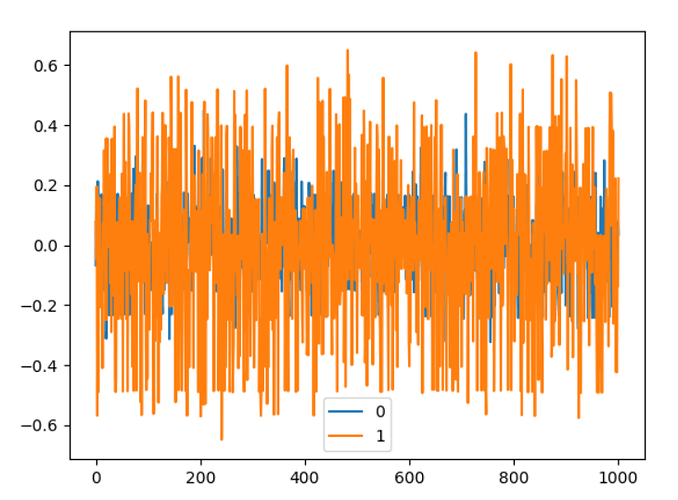


 But it only works as long is firmly hold the motor, as soon as i let it rotate by 1°, the errors (see above) appear, but that is normal i guess?
But it only works as long is firmly hold the motor, as soon as i let it rotate by 1°, the errors (see above) appear, but that is normal i guess?
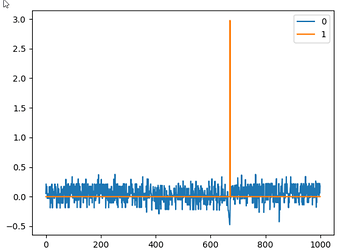
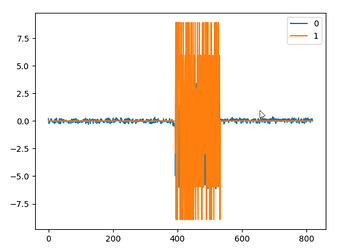
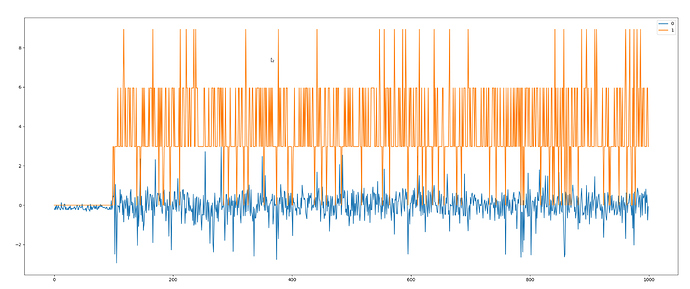
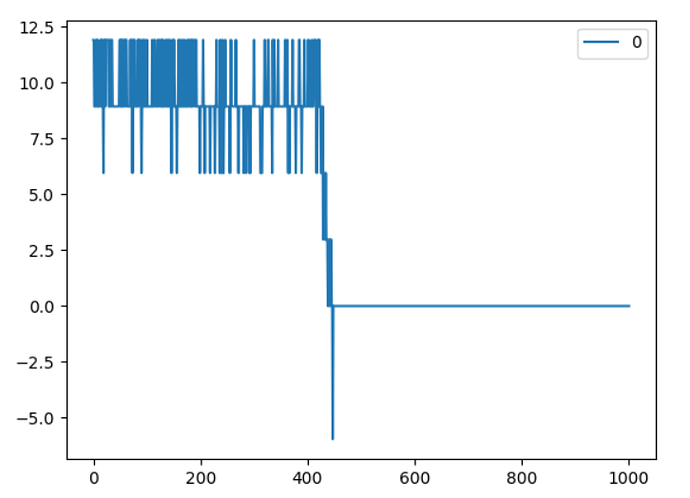


 Thank you very much for your help!!
Thank you very much for your help!!